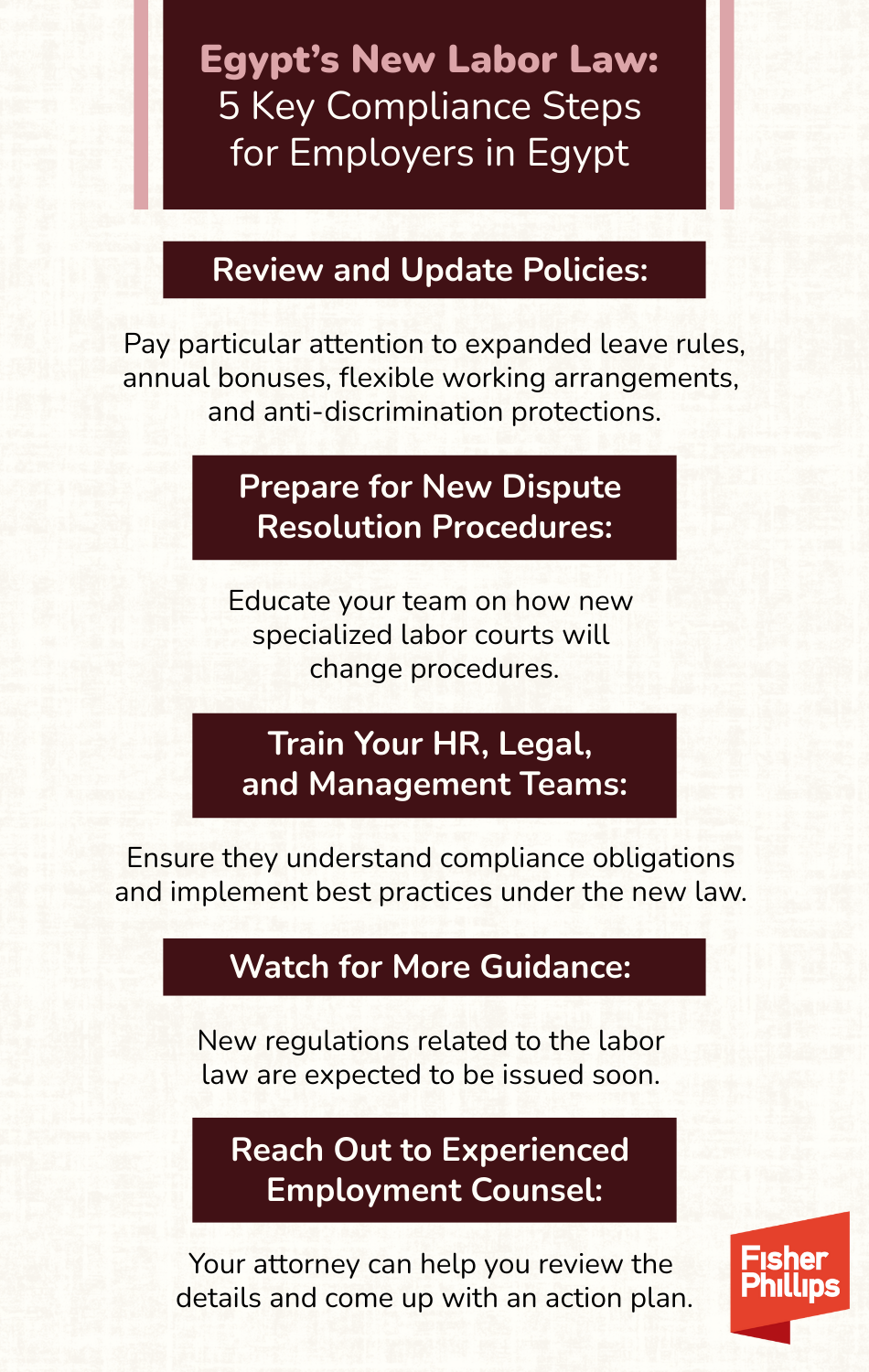A major overhaul to Egypt’s labor laws took effect on September 1, meaning businesses operating in the country should be ready for big changes. Updates impact many aspects of workplace compliance, including family and annual leave, anti-discrimination rules, compensation, and training obligations. The labor law broadly covers both Egyptian and foreign workers who are employed in the private sector, though employees of state agencies and domestic workers are excluded. Here are the top six impacts on the workplace and what you should consider doing now.
1. Changes to Reflect the Modern Workplace
Egypt’s Labor Law No. 14 makes several changes to recognize “new work patterns” or flexible work arrangements that have become popular in recent years, including:
- Remote work
- Job sharing
- Flexible work hours
- Part-time employment
“The same rules that apply to traditional work relationships apply to labor relations in new work patterns, taking into account the nature of each job and the method of performing it,” according to the new law.
2. Anti-Discrimination Protections
Employers should be ready for significantly expanded workplace anti-discrimination rules based on a number of new protected characteristics:
- The law prohibits discrimination in hiring, training, and terms and conditions of employment based on “religion, belief, gender, origin, race, color, language, disability, social level, political, union, or geographic affiliation, or any other reason that would result in a violation of the principle of equality and equal opportunities.”
The new law also protects against harassment, bullying, and other harmful behavior in the workplace.
3. New Leave Requirements
The new law also provides significantly more leave time:
- Maternity Leave: Employees will now be able to take paid maternity leave for 120 days (rather than 90 days) for up to three childbirths during their employment (rather than two). There will no longer be a minimum tenure requirement to qualify for this leave. Additionally, pregnant workers cannot be required to work overtime (during pregnancy and for six months after childbirth) and are entitled to work reduced schedules in the third trimester. They are also entitled to two paid 30-minute lactation breaks each day for up to two years after childbirth.
- Childcare Leave: Female employees in establishments with at least 50 employees may take up to two years of unpaid leave to care for a child. The new law allows covered workers to take this leave three times during their employment (up from two), however there are some restrictions. Employees are eligible for such leave after a year of employment and the period between the first and second leave must be at least two years.
- Paternity Leave: While paternity leave was not provided under the prior law, starting September 1, male employees may take one day of paid emergency leave, without having to use annual leave, for the birth of a child for up to three children during their employment.
- Emergency Leave: Employees will be entitled to an additional day of emergency leave starting September 1 (increased from six to seven days annually), though they will now be limited to using two consecutive days at a time. This leave counts as part of an employee’s annual leave.
- Annual Leave: Employees are eligible for reduced paid time off in their first year of employment if they have at least six months of service. They will receive up to 15 days, and the amount will be prorated based on their length of service. Thereafter, employees are entitled to 21 days annually. Additional days are provided to employees with at least 10 years of service, workers over age 50, workers with disabilities, and those in hazardous jobs.
4. Compensation Changes
- Annual Bonus: Employees in Egypt will now be entitled to an annual bonus of at least 3% of their social insurance wage. The bonus should be paid after one year of service or a year after the last bonus payment. However, if you are unable to pay the bonus due to economic conditions, the National Wages Council may decide to reduce the amount or allow an exemption.
- Sick Leave Pay From Social Insurance System: Eligible employees with medical approval are entitled to sick leave every three years at 100% of their pay for the first three months, 85% for the next six months, and 75% for the following three months.
5. Training and Skills Development
Employers in Egypt are required to contribute to a government program that provides funds for employee training and skills development. The new law delivers good news to employers by changing how contributions are made:
- While the prior law covered employers with at least 10 employees and tied the contribution to profits (1%), the new law mandates that employers with at least 30 employees contribute based on headcount (0.25% of the minimum social insurance wage, with a maximum of 30 EGP per employee).
6. Notice Requirements and New Courts
- Contract Rules: You’ll need to create four copies of employment contracts written in the Arabic language. One copy is for the employer, one is for the employee, another is for the social insurance office, and the last is for the applicable administrative authority.
- Notice of Termination: Employers seeking to end an indefinite-term employment contract need to provide three months’ notice, regardless of the employee’s length of service.
- Resignation Rules: When an employee resigns, their resignation must be approved by the relevant administrative authority. The employee has 10 days to withdraw their resignation after it has been accepted.
- Specialized Labor Courts will be set up to handle employment disputes beginning October 1.
Key Steps for Multinational Employers to Take Now
Businesses operating in Egypt should consider following these recommendations:
- Review and Update Policies: Ensure your policies and practices align with new requirements. Pay particular attention to expanded leave rules, annual bonuses, flexible working arrangements, and anti-discrimination protections.
- Prepare for New Dispute Resolution Procedures: It’s a good idea to educate your team on how the new specialized labor courts will change procedures starting on October 1.
- Train Your HR, Legal, and Management Teams: Ensure they understand compliance obligations and implement best practices under the new law. This is especially critical given steep penalties for noncompliance.
- Watch for More Guidance: New regulations related to the labor law are expected to be issued in the fall.
- Reach Out to Experienced Employment Counsel: This major overhaul includes many nuanced changes, and this Insight simply provides an overview. Your attorney can help you review the details and come up with a plan of action.
Conclusion
We will continue to monitor developments related to legal changes affecting multinational companies, so make sure you are subscribed to Fisher Phillips’ Insight System to receive the latest updates directly to your inbox. If you have questions, contact your Fisher Phillips attorney, the authors of this Insight, or any attorney in our International Practice Group.



